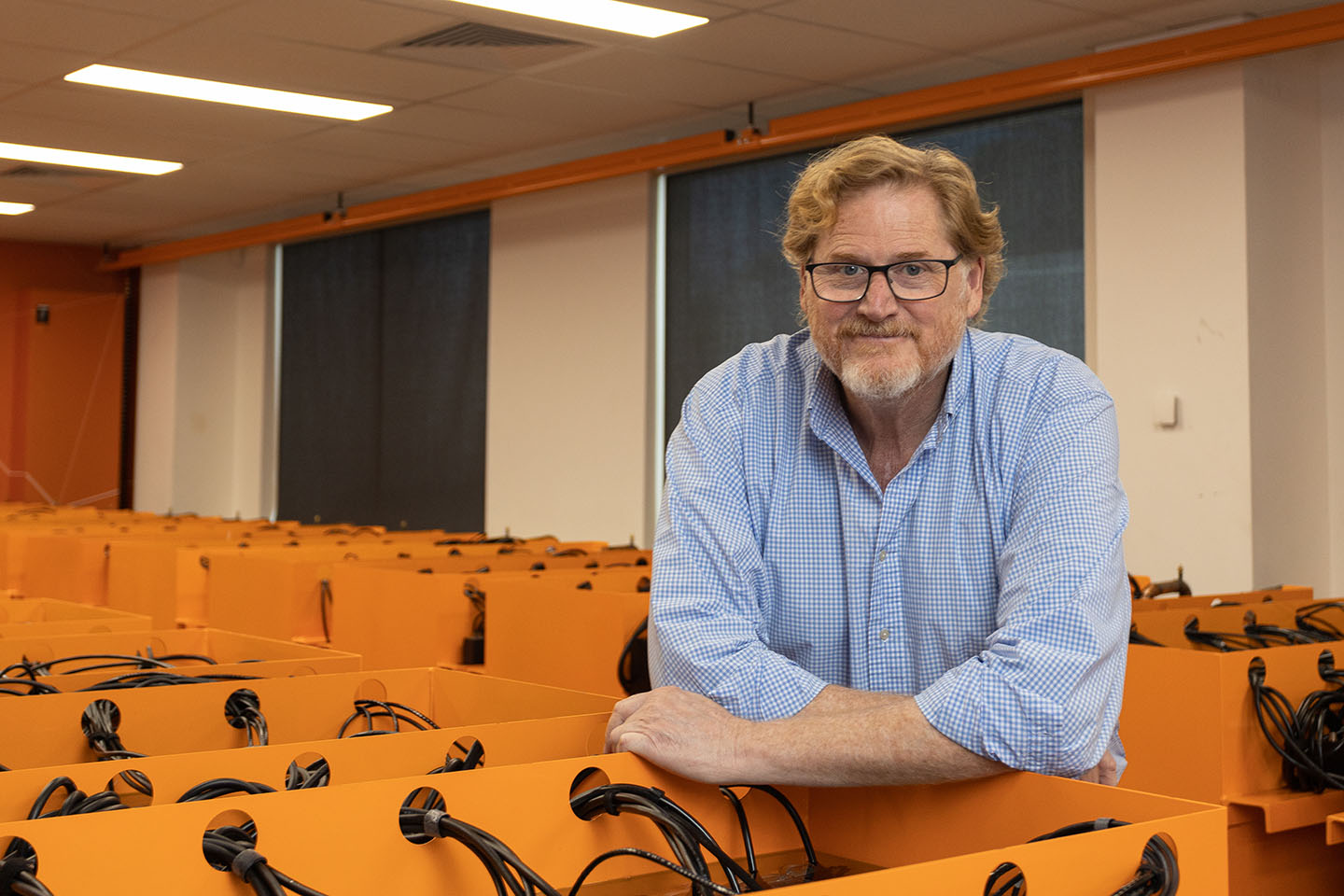Ambitious entrepreneurs and sensible policies could make WA the world’s pre-eminent location for data analytics, remote operations and high-tech industries.


Ambitious entrepreneurs and sensible policies could make WA the world’s pre-eminent location for data analytics, remote operations and high-tech industries.
Matt Lamont has created a successful business analysing data from deep beneath the sea, but now he’s adding a new focus, the deepest reaches of the universe.
DownUnder GeoSolutions (DUG), co-founded in 2003 by Mr Lamont and Troy Thompson, has been using its Bruce supercomputer to process radio astronomy data, a step away from the usual geophysics.
Click here to download the complete liftout
It is one example of how Western Australian businesses with resources expertise can apply their knowledge to other industries.
The International Centre for Radio Astronomy Research used DownUnder’s computer to process data collected by the Murchison Widefield Array radio telescope over five years (about 200 terabytes of data).
Curtin University’s Cathryn Trott headed the research, analysing signals from the earliest moments of the universe, and sharpened up statistical methods for the future Square Kilometre Array, part of which will be built in WA.
Data was shifted to DownUnder for optimised algorithm processing after first being handled by the Pawsey Supercomputing Centre near Bentley.
DownUnder’s supercomputer, Bruce, is the biggest in the Southern Hemisphere with processing power of 20 petaflops, the equivalent of about 2 million laptop computers.
Mr Lamont told Business News other industries had been using the computer, including for defence work and genome analysis.
“We just saw a need, we realised what we’re doing has applications outside of the oil and gas industry,” he said.
“We really are a technology company, it’s a good thing to work outside of oil and gas as well.
“We’re diversifying but we’re not actually changing our core competencies, so it’s beautiful.”
Mr Lamont believes the company’s main competitive advantages are that it is set up for high-performance computing and has developed methods to keep energy use down.
But WA had work to do to sharpen up its competitiveness in data science, he said.
In May 2019, DownUnder opened a new data centre in Houston, USA, with 250 petaflop capacity, part of its global cloud network.
Mr Lamont said more competitive power prices would be one of three critical issues for WA.
Electricity is a major part of the operating costs of a data centre, with the big new Houston facility drawing about 15 megawatts.
An improved visa system for highly skilled migrants would also be vital, he said.
“Bringing people in from around the world is the absolute key in these high-tech areas, and that’s where the current visa situation in Australia is letting down companies such as DUG,” Mr Lamont said.
“Visas need to be sorted so the best talent can come to Australia.
“We’d still like to build one in Australia but it’s just an awful lot easier to build it in Houston.
“It’s a lot easier doing business in London or Houston, believe me, but Perth’s not bad, it’s a desirable location for people to live.”

Peter Klinken says WA is a world leader in remote operations and can look to the skies next. Photo: Gabriel Oliveira
Giant leap for WA
WA chief scientist Peter Klinken said some of the biggest opportunities for the state would be in the space economy, with the McGowan government working to promote the potential across the globe.
The current decade could mark an inflection point for space exploration, with more than 40,000 satellites to be launched and private companies planning ambitious projects.
Australia’s own space agency opened its doors in 2018, with the government estimating the space economy would generate 20,000 jobs and GDP of about $12 billion annually by 2030.
Professor Klinken said WA had some serious offerings for the next space race.
“Geography has given us an enormous advantage: longitude, latitude, the number of satellites going overhead, the fact we’ve got really clear skies, dry air, perfect for downlink capability from satellites, great infrastructure in place,” he said.
“We’re really well positioned for getting into the space industry more and more.”
Professor Klinken said skills in remote operations developed in the mining and energy industries would be transferable to space.
“The resources sector has been dealing with the ability to manage assets remotely for a long time and is really seen as a global leader in this area,” Professor Klinken told Business News.
“If you can do remote mining from WA for mines that are 2,000 kilometres away, you could be doing remote things in space.”
Last year, Fugro and Telstra opened a remote operations centre for subsea robots, based in Gnangara.
It follows facilities built for Rio Tinto, Fortescue Metals Group, BHP, Roy Hill and Woodside Petroleum.
In February, Woodside and Fugro were part of the Australian Remote Operations for Space and Earth consortium which planned to set up a remote operations hub for space work in Perth.
“You go to where the expertise is,” Professor Klinken said.
“The expertise is here.”
In July, the Australian Space Agency committed $6 million for projects in WA, including for a robotics and artificial intelligence mission control facility.
The facility could be used to support the US National Aeronautics and Space Administration, or alternative operators, in any Moon or Mars mission.
Aside from the obvious challenges of distance, there are no satellite systems on the Moon or Mars to determine positions of vehicles, so there will be a greater requirement of visual and radar data.
Professor Klinken said the European Space Agency was considering expanding its facilities in New Norcia, and planned to undertake data analysis in WA.
There also could be work closer to earth.
“WA has got more autonomous vehicles than California, we’ve got 70 per cent of the world’s autonomous mining vehicles ... it really is world-leading technology,” Professor Klinken said.
“A lot of that, if we’re smart, can be transferred into related or ancillary industries.
“We need to create an environment that allows greater sharing of these technologies, and be more open to collaboration.”
He said big resources companies could be considering how they might spin-out their technology products, potentially into separate businesses, to pursue options outside the sector.

Woodside has worked with NASA's robonaut. Photo: Attila Csaszar
Possibilities
Leaders in both public and private sectors are exploring diverse economic opportunities, with the state government creating three innovation hubs through its New Industries Fund.
Those are: the WA AustCyber Innovation Hub with Edith Cowan University; WA Data Science Innovation Hub with Curtin University; and MTPConnect WA Life Sciences Innovation Hub with the University of Western Australia.
The data science hub will support smaller businesses with access to university infrastructure, trained graduates, upskilling programs, and in translating data science capabilities from resources to other sectors.
The life sciences hub will support the medical technology sector, including devices, clinical trials, commercialisation and investment attraction.
The cyber innovation hub will partner with local businesses to build products and target export markets.
Then there’s the LNG Jobs Taskforce, where the private sector and government are collaborating to develop opportunities in new technology and education.
An example is the $40 million micro-LNG plant to be built in Kwinana as a research and development hub.
Technical expertise discovered through the plant will be used in WA’s commercial scale facilities and could be exported overseas.
WA also has globally significant capability in the ocean economy.
UWA is ranked seventh in the world in marine and ocean engineering, according to the Academic Ranking of World Universities.
It’s 28th in oceanography.
That will be bolstered by Andrew Forrest’s donations of $100 million for ocean conservation in 2018 and $US300 million last year for plastic waste reduction.
Andrew Outhwaite, managing director of consultancy We Are Arising, recently authored the ‘For Blue’ report reviewing how WA can expand leadership in the blue economy.
Focus areas included advanced manufacturing, adapting to sea level rise, and in clean ocean products.
“We have the brainpower, we’re already the hub of marine science in the Indian Ocean,” Mr Outhwaite said.
“The commercialisation of our academic capabilities, application across different industries, and looking to grow that into services we can provide other nations, that’s where it’s a bit lacking.”
Taking positions
Sparking development in the technology ecosystem will need the right policies.
In the lead up to the 2019 federal election, the Australian Computer Society set out its wish list to make the national sector more competitive.
Changes to encourage capital allocation towards startups were one priority, modelled off the UK’s Enterprise Investment Scheme and Seed Enterprise Investment Scheme.
Moves would include a broader definition of early stage investment company and, more radically, an accord with superannuation funds to voluntarily commit 0.5 per cent of funds under management to high-growth startups.
Artificial intelligence research and commercialisation should be a national priority, ACS argued, enabled by making more government datasets available, backed up with funding for 1,000 AI doctorates.
“Technology transfer is best done in people’s heads, and the fastest way to move AI out of academia and into practice is to train the nation’s human capital,” the ACS said.
Locally, Startup WA chair and Cisco Innovation Central lead Tom Goerke said some simple changes would make a big difference.

Tom Goerke. (Photo: Gabriel Oliveira)
Among these was the speed with which big companies paid invoices to startups, already a common concern among contractors that has attracted media attention in recent weeks.
“It [prompt payment] is really important for startups,” Mr Goerke said.
For the state government, it should be a priority to reduce red tape on startups competing for work, he said.
An example was the requirement for businesses to have traded for at least three years in order to tender for some government work, which was a big barrier to entry for startups.
Government could also package up problems as challenges for startups to develop solutions.
In Scotland, the Civtech program gives tech hopefuls the opportunity to use digital technology to improve public sector services and win contracts.
Agencies present problems and go to market for solutions, rather than picking solutions and contracting execution.
In WA, the non-government organisation Ministry of Data hosts hackathons like this.
Mr Goerke said the Scottish approach would be a win-win for government and the tech industry.
“Government, like any business, should be passionate about spending efficiently ... and also driving the development of the economy,” he said.















